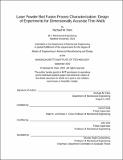Laser Powder Bed Fusion Process Characterization: Design of Experiments for Dimensionally Accurate Thin Walls
Author(s)
Flam, Rachael M.
DownloadThesis PDF (2.586Mb)
Advisor
Hardt, David
Hart, John
Terms of use
Metadata
Show full item recordAbstract
Metal Laser Powder Bed Fusion (M-LPBF) is a method of additive manufacturing that enables the fabrication of complex components that would not otherwise be possible through conventional manufacturing techniques. M-LPBF is well suited for aerospace applications because of its ability to fabricate geometrically complex and efficient components. It can also enable the reduction of costs and the schedule of programs. The recent advancements in material development have the potential to widen the design space even further for aerospace applications, but the initial process of evaluating a new material on a M-LPBF printer can be time-consuming and costly. In this thesis, a framework to improve the efficiency and structure of M-LPBF process development is proposed. First, simulations of the melt pool were performed to understand the impact of primary process parameters on the dimensions of the melt pool. Then, tools to model the melt pool were tested and used in combination with analytical equations to identify an acceptable processing window for the M-LPBF process. Following this process parameter filtering, physical experiments were executed that investigated the impact of process and design parameters on various outputs connected to the melt pool, density, dimensional accuracy, and surface roughness of the coupons printed. Optimal parameter ranges can then be determined according to different design and process priorities. The framework developed in this project enables a material and machine agnostic approach to process parameter selection in less time and at a lower cost.
Date issued
2022-09Department
Massachusetts Institute of Technology. Department of Mechanical EngineeringPublisher
Massachusetts Institute of Technology